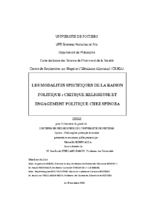Konin Alla Marcellin
Les modalités spécifiques de la raison politique : critique religieuse et engagement politique chez Spinoza
frConsulter le texte intégral de la thèse (format PDF)

Résumé
Français
Les modalités spécifiques de la raison politique : critique religieuse et engagement politique chez Spinoza
Notre travail interroge la religion et la politique à la lumière de la critique du spinozisme. Il s'en dégage que : dans la forme, la raison discursive, et critique s'oppose à la foi comme révélation et certitude non-réfléchie mais leur contenu (l'Absolu) les unit. Dès lors, la raison élève le sentiment religieux (le fini accède à l'Infini par la réflexion), inversement, la foi fonde la rationalité. Cependant, nous nous demandons si cette rationalité de la foi ne nie pas sa spécificité. Envisager avec Spinoza la séparation de la philosophie et de la théologie afin de permettre la liberté de pensée et d'expression. En effet, l'analyse de la connaissance rationnelle dans son rapport avec la connaissance théologique nous conduit à sceller la distinction entre le théologien et le philosophe d'une part et de l'autre entre le théologien et le politique. Le conatus spinoziste doit pouvoir permettre de vaincre l'asservissement et les préjugés, et conduire les individus à la liberté et au salut de la société.
Mots-clés libres : nature, éthique, vérité, raison, droit, démocratie, affections, anthropomorphisme, athéisme, béatitude, connaissance, Dieu, naturel, état, finalisme, foi, imagination, immanence, liberté, monisme, pacte, panthéisme, politique, passions, religion, sagesse, salut, souveraineté.
- Spinoza, Baruch (1632-1677) -- Critique et interprétation
- Philosophie et religion
- Religion et politique
- Théologie et philosophie
English
The specific character the political reason : religious criticism and political commitment in Spinoza
The thesis examines the relationship between religion and politics from the Spinozist critical perspective. In terms of form, discursive and critical reasoning is opposed to faith which can be characterised as a non-analytical certainty taking the form of revelations. In terms of content however, reason and faith are united by their shared content a sense of the Absolute. In these circumstances reason is able to promote religious feeling, the finite becoming infinite thanks to meditative thought ;conversely, faith can provide a basis for rationality. Nonetheless, is it not possible to see this rationality of faith as a denial of that which specifically defines faith ? Spinoza's aim was to separate philosophy from theology so as to liberate thought and freedom of expression. As a matter of fact, the analysis of rational understanding and its relations with theological knowledge gives us a better grasp of what differentiates the theologian and philosopher on the one hand, and the theologian and politician on the other. Spinoza's 'conatus' should allow us to overcome subordination and prejudice, taking us toward liberation and the salvation of society.
Notice
- Diplôme :
- Doctorat d'Université
- Établissement de soutenance :
- Université de Poitiers
- Établissement de co-tutelle :
- Centre de recherches sur Hegel et l'idéalisme allemand (Poitiers)
- UFR, institut ou école :
- UFR de sciences humaines et arts (SHA)
- Domaine de recherche :
- Philosophie politique et sociale
- Directeur(s) de thèse :
- Jean-Louis Vieillard-Baron
- Date de soutenance :
- 20 septembre 2008
- Président du jury :
- Jacqueline Lagree
- Membres du jury :
- Jean-Louis Vieillard-Baron, Marie-Françoise Ong-Van-Cung, Franck Fischbach
Menu :
-
-
À propos d'UPthèses
-
Voir aussi
Annexe :
-
Une question ?
Avec le service Ubib.fr, posez votre question par chat à un bibliothécaire dans la fenêtre ci-dessous :
ou par messagerie électronique 7j/7 - 24h/24h, une réponse vous sera adressée sous 48h.
Accédez au formulaire...
Université de Poitiers - 15, rue de l'Hôtel Dieu - 86034 POITIERS Cedex - France - Tél : (33) (0)5 49 45 30 00 - Fax : (33) (0)5 49 45 30 50
these@support.univ-poitiers.fr -
Crédits et mentions légales
